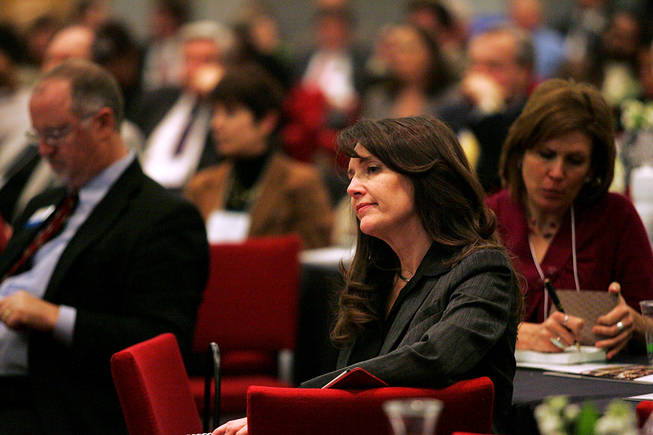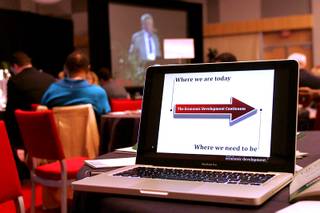
Attendees listen to a speaker at a conference on how to diversify NevadaAos economy Friday, January 7, 2011.
Saturday, Jan. 8, 2011 | 2 a.m.
Sun archives
- Economic diversification to be looked at from all sides (1-3-2011)
- To diversify, Nevada must better educate, community leaders conclude (12-10-2010)
- Las Vegas ranks near bottom of ‘Brainiest Bastions’ list (12-6-2010)
- Diversification dollars demanded (9-24-2010)
- Officials choose 7 proposals in effort to diversify economy (9-14-2010)
- Ed Week study: Nevada last in rankings for “chances for success,” fares slightly better in others (1-15-2010)
- Effort will look at diversification of Vegas economy (10-9-2009)
- Economic diversity, new jobs are essential, leaders say (9-4-2009)
If Nevada escapes its current morass and in a couple of decades becomes a more prosperous, economically diverse and humane place, historians may view a UNLV conference, oddly enough, as a turning point.
“Nevada 2.0,” which brought together business, political and nonprofit leaders and academics, felt like an epiphanic moment for Nevada’s elite — a recognition that doing things the way we’ve always done them is not a solution, and that we should look to outsiders for guidance.
“Now we have the time to reflect, learn from others and find a path to the future,” said Don Snyder, chairman of the Smith Center for the Performing Arts, UNLV dean and former banking and gaming executive.
Nevadans seemed to experience some eye-opening moments during presentations by economic development professionals from Dallas, Denver, Phoenix and Salt Lake City, all of which have surpassed Las Vegas in most measures of prosperity, livability and innovation.
“This was an attempt to say, ‘Here’s four other places doing it better than we are. What can we learn?’ ” said Robert Lang, a conference organizer and UNLV professor and director of Brookings Mountain West.
The speakers sounded a consistent theme: Produce more college graduates; find your strongest economic clusters and build on them; use nonprofit organizations to get the ball rolling if government won’t; and invest in the infrastructure that will prepare you for the next boom.
• Arizona invested in higher education and relied on public-private partnerships to further economic development. One example: the Flexible Display Center, a joint venture among Arizona State University, the Army and 27 industry partners, where researchers are developing lightweight, flexible video display screens the size and width of a credit card.
Also, industry leaders were hired to work on university campuses to create business opportunities, while in turn the state drew on university researchers to build industry clusters.
• Texas revamped its tax structure to help emerging industries, and lawmakers approved an “economic development sales tax” of up to a half cent to fund projects. Mike Rosa, vice president of the Dallas Regional Chamber, cited the development of Dallas/Fort Worth International Airport as a key investment that helped bring Fortune 500 companies to what was once a backwater.
• Utah created the Utah Science Technology and Research Initiative, a state-funded investment in pure research through its universities. The resulting new technologies are being commercialized, and Utah has one of the strongest economies in the nation.
• In the mid-1980s, Denver was not unlike Las Vegas today — an economic basket case suffering a hangover from the energy and savings and loan booms and busts. City fathers focused on collaborating to build up strengths such as aerospace and telecom and invested in major projects such as the airport and convention center. And they cleaned up their dirty air. Now Denver is a powerhouse.
During two decades of high-octane growth, Nevada’s leadership assumed our way was the best way to prosperity and tended to ignore the rest of the world. This is not to say there weren’t discussions.
In fact, Friday’s conference repeated themes heard among some of Nevada’s leaders and thinkers for decades. Conference members cited 20-year-old legislative reports that concluded the same thing: Nevada must diversify.
But now, there appears to be an inkling — if only that — of a recognition of the need to act. Consider it a silver lining to the devastating blow the state’s economy took in recent years.
“I’ve participated in a lot of conversations about the types of things we’re talking about today and it has been very difficult to get serious,” Snyder said. “When things are going really well, it’s hard to take the time to change. But if there’s ever a time to get serious, it’s now.”
Nevada’s leaders, a large number of whom were gathered in the UNLV ballroom, finally seemed committed to taking stock of the state’s flailing economy and accepting advice from neighboring states that look similar to Nevada but have fared much better.
One obvious roadblock: When the Legislature meets next month, it faces a budget deficit of at least $2 billion, and there seems to be little appetite for the kinds of new taxes or cuts to existing programs that would be required to make the investments championed by those other cities.
Lang warned that the work needs to begin, and soon: “I wouldn’t expect to build an entire economy out of the idea that a high school graduate can get a good job. That doesn’t seem like a good bet.”


Join the Discussion:
Check this out for a full explanation of our conversion to the LiveFyre commenting system and instructions on how to sign up for an account.
Full comments policy